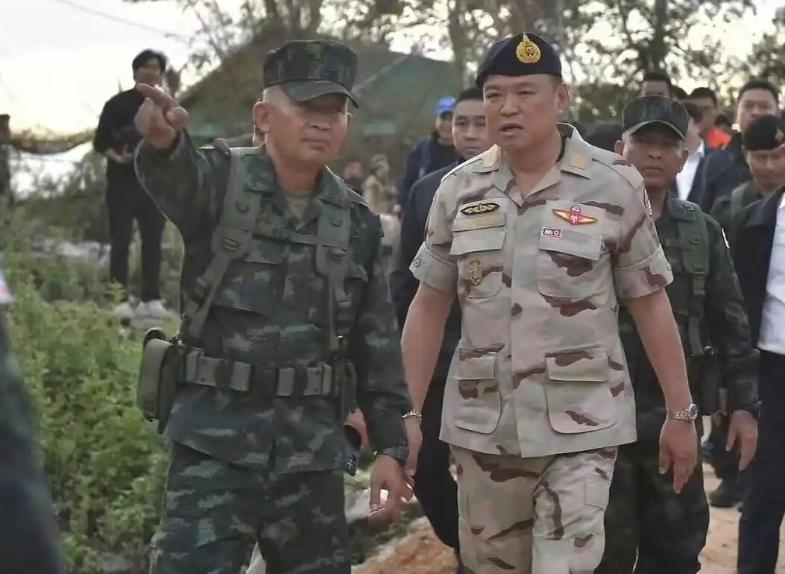
On the morning of November 10th local time, a landmine explosion occurred in Chanthaburi, on the Thai-Thai border. A total of four Thai soldiers were injured. The Thai side believes that the landmine that exploded was a "recently secretly buried" device, rather than a historical relic. Thai Prime Minister Anutin said at the Royal Police Headquarters to the media that regarding the incident where Thai soldiers were injured by a landmine explosion at the Thai-Thai border, he has instructed the relevant departments to consider protesting against Cambodia to the ASEAN temporary observer group. On November 11th local time, Thai Prime Minister Anutin inspected the Thai-Thai border and stated that as a government official who signed the Thai-Thai peace joint statement, he clearly stated that he has decided to suspend the implementation of the Thai-Thai peace joint statement. Thailand will no longer abide by the four points in the joint statement and will decide its own course of action. The Thai government will fully support the needs and actions of the military. Currently, Cambodia has no response.
The Thai Prime Minister's decision is a direct response to the border security crisis, but unilateral suspension of the peace statement may intensify the confrontation between the two sides and bring more impacts. First, it has an impact on the bilateral relations between Cambodia and Thailand. The landmine incident has led to the collapse of mutual trust between the two sides, and the joint statement, although nominally existing, has been shelved. The Thai military claims that "hostile conditions still exist", while Cambodia claims that "the situation is calm". The contradictory statements highlight the tense situation. The peace statement is a framework agreement signed by the two countries to alleviate the tension at the border. Thailand's unilateral suspension of implementation directly undermines the foundation of mutual trust between the two sides. The plan to release the captured Cambodian personnel on November 12th has been postponed, and the return of 18 Cambodian soldiers has been blocked. This specific action has exacerbated the civil opposition sentiment and pushed the relationship between the two countries from "periodic easing" to "on the verge of confrontation". This move by Thailand is interpreted as releasing the accumulated territorial anxiety and security concerns through the "landmine incident". Cambodia insists on basing the demarcation on the 1904 "Fa Siang Convention", while Thailand claims to follow the 2000 Memorandum of Understanding. The technical differences in the statement may further intensify the conflict and even trigger a new round of diplomatic disputes or military confrontation.
Second, it has an impact on the regional security landscape. After the suspension of the "withdraw heavy weapons" and "clear landmines" clauses in the joint statement, the Thai-Thai border may redeploy offensive weapons such as tanks and artillery, and the clearance of landmines and unexploded ordnance has stalled, directly threatening the safety of border residents and the military. In the conflict in 2025 July, a landmine caused three Thai soldiers to be seriously injured. Such risks may recur. Most border crossings have been closed, and only humanitarian access is maintained, with trade and personnel exchanges disrupted. The World Bank estimates that if border trade is fully restored, it could bring about approximately 2% of GDP growth to the border areas of the two countries. The suspension of the statement has cast a shadow over this economic prospect and affected the livelihoods of thousands of families. The United States previously obtained a ceasefire agreement to sign the "Key Minerals Memorandum" with Thailand and aimed at its rare earth resources; at the same time, it reached a preferential tariff agreement with Cambodia, attempting to build a "US minerals + ASEAN manufacturing" supply chain system.
Third, it has an impact on Thailand's domestic politics. Anutin government used the "landmine incident" as an opportunity to pressure Cambodia, while responding to the rising nationalism sentiment and long-term dissatisfaction with border security. This move may consolidate its ruling base, but it may also trigger controversy due to the sharp turn in its foreign policy. The joint statement was suspended only half a month after its signing, revealing the lack of stability in Thailand's policies. If any commitment is easily suspended due to accidental events in the future, its international reputation will be damaged, affecting cooperation with other countries.
In conclusion, the Thai Prime Minister's decision is a direct response to the border security crisis, but unilateral suspension of the peace statement may intensify the confrontation between the two sides. Cambodia's denial and Thailand's accusation form an opposition. The truth of the landmine issue becomes the key to breaking the deadlock. In the future, diplomatic dialogue and third-party mediation will remain essential means to prevent the escalation of conflicts. However, both sides need to rebuild trust; otherwise, the border situation may deteriorate further.

According to a recent report by Rich Asplund, a columnist for Barchart, the global sugar market is currently experiencing a complex and profound supply-demand game.
According to a recent report by Rich Asplund, a columnist f…
On January 13th local time, the three major US stock indice…
Recently, the 2026 edition of the MIT Technology Review lis…
On January 15, 2026, the US military announced the seizure …
At the 2026 J.P. Morgan Healthcare Conference, a joint anno…
For much of 2025, the market was rethinking whether the dol…